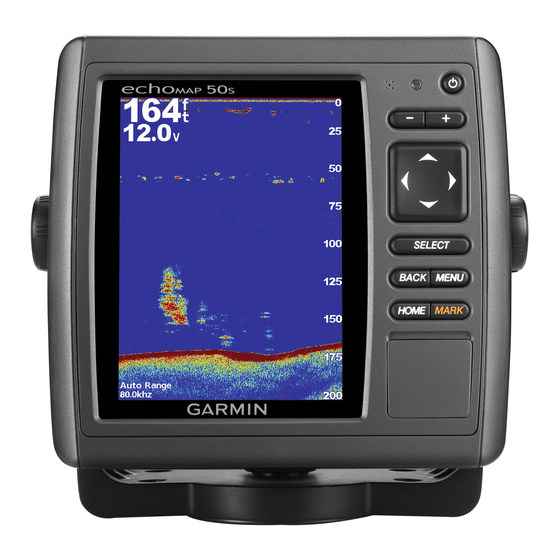Garmin GPSMAP 557 Instrukcja obsługi - Strona 26
Przeglądaj online lub pobierz pdf Instrukcja obsługi dla Morski system GPS Garmin GPSMAP 557. Garmin GPSMAP 557 38 stron.
Również dla Garmin GPSMAP 557: Skrócona instrukcja obsługi (4 strony), Instrukcja instalacji (8 strony)

chartplotter. The weather data for each feature comes from
reputable weather data centers such as the National Weather
Service and the Hydrometeorological Prediction Center. For
more information, go to www.xmwxweather.com.
SiriusXM Equipment and Subscription
Requirements
To use XM WX satellite weather, you must have a compatible
satellite weather receiver. To use SiriusXM satellite radio, you
must have a compatible satellite radio receiver. Go to
www.garmin.com
for more information. You must also have a
valid subscription to receive satellite weather and radio. For
more information, refer to the instructions for your satellite
weather and radio equipment.
Weather Data Broadcasts
XM WX Satellite Weather data is broadcast at five-minute
intervals. When the Garmin receiver is turned on, or when a
different weather feature is selected, the receiver must receive
new data before it can be shown. You might experience a delay
before weather data or a different feature appears on the chart.
NOTE: Any weather feature can change in appearance if the
source that provides the information changes.
Viewing Precipitation Information
Precipitation ranging from very light rain and snow, up to strong
thunderstorms, is indicated in varying shades and colors.
Precipitation is shown either independently or with other
weather information.
Select Weather > Precipitation.
The time stamp in the upper-left corner of the screen
indicates the elapsed time since the weather data provider
last updated the information.
Precipitation Views
Select Weather > Precipitation > Menu.
Radar Loop: Shows precipitation information as an image of
the latest update or as an animated loop of the latest
updates. The time stamp indicates the elapsed time since
the service provider generated the weather radar frame
currently displayed on the screen.
Cloud Cover: Shows cloud cover data.
Satellite IR: Shows infrared satellite data, which displays clouds
based on cloud-top temperatures. Deeper shades of gray
represent colder clouds often found with cirrus or
thunderstorm clouds. Lighter shades or a lack of shading
indicate warmer clouds usually associated with stratus or
fog.
Waypoints: Shows waypoints.
Legend: Shows the weather legend.
Storm Cell and Lightning Information
Storm cell icons
on the weather Precipitation chart indicate
both the present position of a storm and the projected path of
that storm in the immediate future.
Red cones appear with a storm cell icon, and the widest part of
each cone points in the direction of the projected path of the
storm cell. The red lines in each cone indicate where the storm
will most likely be in the near future. Each line represents 15
minutes.
Lightning strikes are represented by
the weather Precipitation chart if strikes were detected within
the last seven minutes. The ground-based lightning detection
network detects cloud-to-ground lightning only.
20
. Lightning appears on
Hurricane Information
The weather Precipitation chart can show the present position
of a hurricane
, a tropical storm, or a tropical depression. A
red line stemming from a hurricane icon indicates the projected
path of the hurricane. Darkened dots on the red line indicate the
projected locations through which the hurricane will pass, as
received from the weather data provider.
Weather Warnings and Weather Bulletins
When a marine weather warning, weather watch, weather
advisory, weather bulletin, or other weather statement is issued,
shading indicates the area to which the information applies. The
aqua lines on the chart indicate the boundaries of marine
forecasts, coastal forecasts, and offshore forecasts. Weather
bulletins may consist of either weather watches or weather
advisories.
To view information about the warning or bulletin, select the
shaded area.
Color
Marine Weather
Group
Light Blue Flash Flood
Dark Blue Flood
Yellow
Marine/Wind
Pink
Miscellaneous
Orange
Severe Storm
Red
Tornado
Purple
Tropical
Dark
Visibility
Gray
White
Winter
Forecast Information
The Forecast chart shows city forecasts, marine forecasts,
warnings, hurricane warnings, METARS, county warnings,
weather fronts and pressure centers, surface pressure, and WX
buoys.
Viewing Forecast Information for Another Time
Period
1
Select Weather > Forecast.
2
Select an option:
• To view the weather forecast for the next 12 hours, select
Next Forecast or , and to view forecasts up to 48 hours,
in 12-hour increments, select Next Forecast or again.
Weather Subcategories
Areal Flood, Coastal Flood, Debris Flow,
Flood, High Water Level, Hydrological,
Lakeshore Flood, Storm Surge
Brisk Wind, Extreme Wind, Freezing
Spray, Gale, Hazardous Seas, High Surf,
High Wind, Hurricane Force Wind, Lake
Wind, Les Suêtes Wind, Low Water,
Marine Weather, Rip Tide, Small Craft,
Small Craft Hazardous Seas, Small Craft
Rough Bar, Small Craft Winds, Special
Marine, Squall, Storm, Strong Wind,
Tsunami, Waterspout, Wind,
Wreckhouse Winds
Air Quality, Air Stagnation, Ashfall,
Blowing Dust, Excessive Heat, Fire
Weather, Heat, High Heat and Humidity,
Humidex, Humidex and Health, Rainfall,
Special Weather, Weather
Hurricane, Inland Hurricane, Inland
Tropical Storm, Tropical Storm, Typhoon
Dense Fog, Dense Smoke, Dust Storm,
Smog
Arctic Outflow, Avalanche, Blizzard,
Blowing Snow, Cold Wave, Extreme
Cold, Flash Freeze, Freeze, Freezing
Drizzle, Freezing Fog, Freezing Rain,
Frost, Hard Freeze, Heavy Freezing
Spray, Heavy Snow, Ice Storm, Lake
Effect Blowing Snow, Lake Effect Snow,
Sleet, Snow, Snow and Blowing Snow,
Snow Squall, Snowfall, Wind Chill,
Winter Storm, Winter Weather
SiriusXM™
